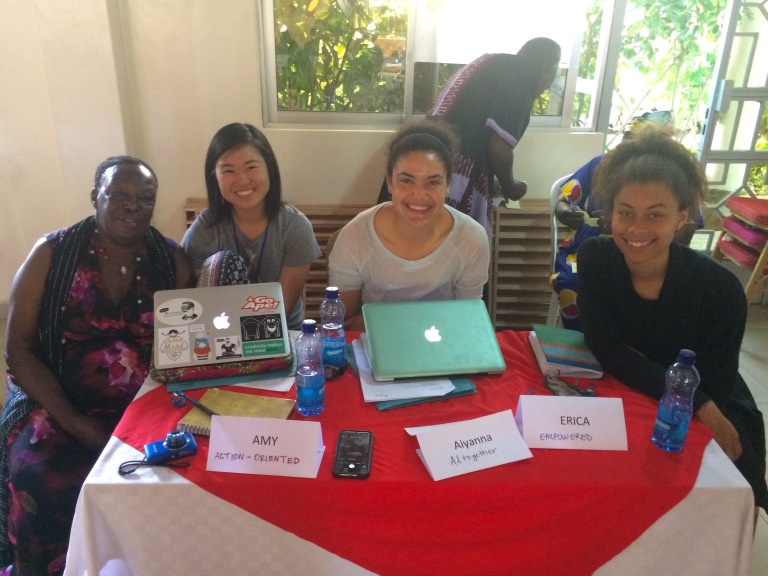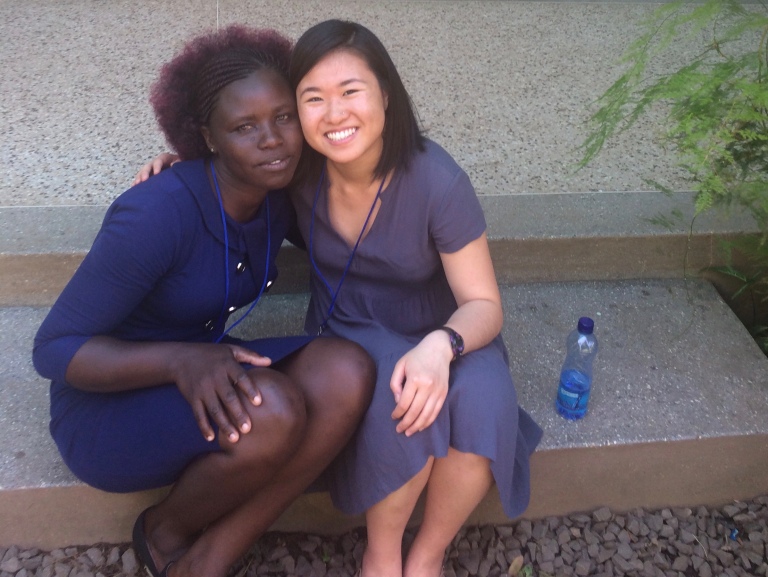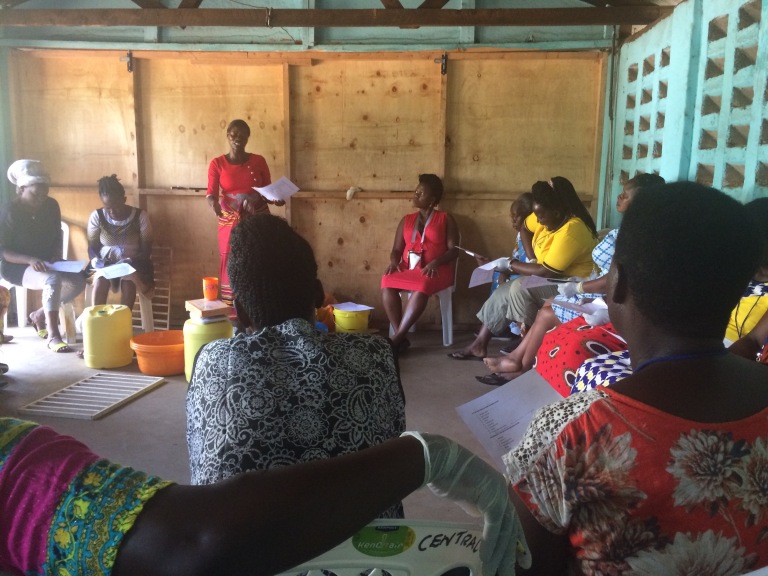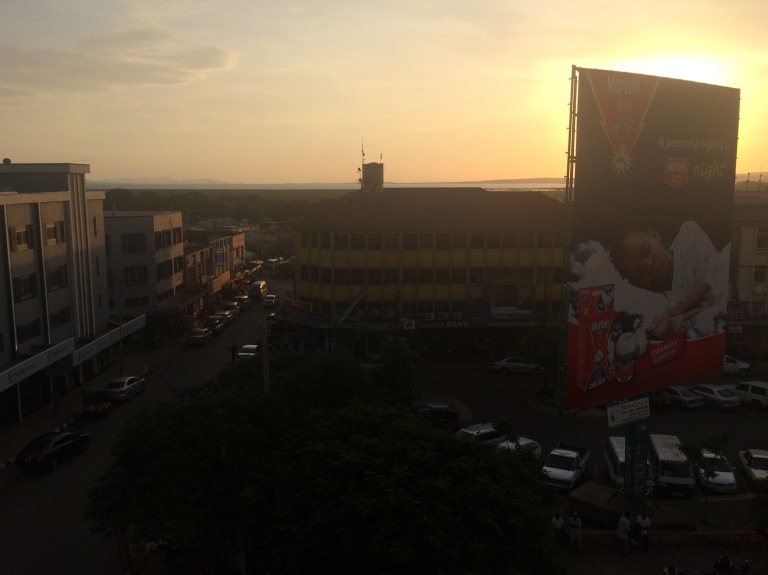Background/the “what”
Jambo from Kisumu, Kenya! I’m spending my spring break working with Global Women’s Water Initiative, a nonprofit that trains Kenyan, Ugandan, and Tanzanian women in WASH (water, sanitation, and hygiene) technologies as well as in leadership and entrepreneurship. We are here to help facilitate a week-long “continuing leadership” training—at this point, these women have all completed the technical WASH academy and all successfully run their own organizations that bring clean water (by building tanks, filters, etc.) and sanitation practices (building latrines, making soap and reusable menstrual pads, etc.) to communities, on top of tackling issues like women’s empowerment and access to education. This training exists to help them expand their impact and lobby for support by leveraging story-telling for influence.


The real stuff/the “how”
We arrived in Kenya with admittedly minimal preparation, both logistically and training content-wise. I checked into my 30-hour flight mere hours after handing in a midterm and somehow managed to do all my packing in between those two events, and we weren’t given a lesson plan or job roles or anything really other than Gemma’s blessings and brief backstories on some of the women we would meet. I now realize that this was intentional, that Gemma wanted us to walk in with an open heart and mind, but at the time I was a little worried about how I was supposed to help if I didn’t even know what I was even helping with. And so this was the fundamental problem: that I thought I was selected to go on this trip because I could offer something. While I was very aware of the problematic connotations of “voluntourism” and the “white savior complex” my trip carried, I didn’t realize the extent to which I needed to check my privilege and assumptions at the door. Being open-minded honestly wasn’t enough—I should have gone in completely empty. By the end of the trip, I would learn that I was there to absorb and receive so much more than I could ever hope to offer.

One of our first exercises was to tell a two-minute story about a time we wanted something. In my breakout group, I brazenly went first with a silly story about wanting a dog as a kid and just recently convincing my parents to adopt one, even rambling past the two-minute time limit. It wasn’t until the next few women told their stories that I realized two things:
- I legitimately don’t even think I understand the true meaning of the word “want” the way some of these women do—when I use the word “want,” I probably mean “it would be kind of nice to have” (a furry pet, for instance). I don’t know that I’ve ever used it to mean what it does when someone says, “I wanted to make it out of this divorce alive,” or “I want my daughters to never have to go through what I did,” or even “I wanted to be able to afford my children’s education.”
- Whereas I seemed to interpret the two-minute mark as more of a suggestion, everyone else stopped the millisecond my watch timer beeped, and I kept having to prompt them to finish telling their stories. These women recognized what I did not: that finishing their story might come at the expense of someone else being heard, so they were incredibly conscientious about not taking up someone else’s space.
So my dog story was a bust, but then I figured I could build rapport by offering my own narrative or my immigrant parents’ narrative of sacrifice and struggle in exchange. When we sat down for dinner, I asked questions about where they grew up and how they ended up where they are now, totally caught off guard when I received answers like, “my parents didn’t value girls’ education,” or “I watched my mother being beaten by my father growing up,” or even, “I as abused as a child so I became a primary school teacher.” I was so, so wrong about being able to relate. For the rest of the week, I vowed to come in with only genuinely open-ended questions, and not just leading ones or ones I thought I had an answer to. I became intentional about active listening instead of listening for the sake of responding—my experience improved significantly when I assumed that I had nothing to offer; I was there to listen, learn, and be thoroughly touched by these women’s stories.

Their stories, oh my god, their stories. These were stories that brought about tears of sadness, and also tears of solidarity and triumph and pride. I thought I was done crying after watching Moana on the plane ride here, but I freaking cried when I heard these stories. I’ve let on hints and keep alluding to them, yet you’ve really only seen glimpses of their beginnings. The most incredible part of these women’s stories was that no one told their story to call in a pity party—they told their stories to say, “look how far I’ve come.”
Take Rose, a soft-spoken, unassuming woman with a tenacious spirit, for instance. She was the youngest of eleven children, and her parents died when was still pretty young, so she was raised by her brothers’ wives. They didn’t care for her the way they cared for their own children—sometimes leaving her without food, other times refusing to pay for her clothes and school books, so Rose decided to be a teacher to become something of a surrogate mother to kids who grew up in similarly lacking circumstances. She now runs a sanitation club at her primary school, where they operate a soap-making business that splits the profit amongst her students for things like books and school fees, and also contributes to an emergency fund for the kids who are struggling at home, the ones Rose sees right through. Rose led a soap-making workshop for all of us during the training so that the other women can take home another income-generating skill for themselves and for their communities!

Or Mama Grace, one of the older women who is poised beyond measure. Years ago, she married a man from the Karamoja region of Uganda and was taken home to his tribal village, where she was stripped naked, debased and humiliated, and initiated into his tribe. She watched a man kill one of his wives and be let off scot-free, she saw girls squatting behind bushes in holes they dug for themselves while they menstruated for three days straight every month, and she felt the helplessness that the tribal women felt. She managed to convene together a group of 500 women from the tribe because they thought she had food to offer them, but she said, “no, I’m here to offer you an alternative.” She gave each woman a tree to plant so that they could tend to the tree and spend time away from the house and domestic violence, and eventually so that they could sell the fruits and prove that they could contribute economically. They started a community fund with the profits to allow women to borrow and invest, building each other up rather than depending on their husbands. Mama Grace now serves as the Executive Director of AWARE (Action for Women and Awakening in Rural Environments).
And of course there are so many more: there’s Wanjiru who only wears pants because she demands to be treated like a man. There’s Linnet whose family married her off because they couldn’t afford the rest of her secondary education, so she had her first child at 16, and now her son is preparing to go to college. There’s Rosemary who survived breast cancer and Regestrude who is HIV positive, and both are urging women to get screened because “fear and lack of knowledge make women die.” There’s Mama Angella who was once a refugee herself in South Sudan and now helps Sudanese refugees in Northern Uganda access clean water.
By the end of the training, each of the women had to pitch one of their stories along with a solution to the problem, and they were taught that the ideal pitch structure had a “hook” at the beginning. Someone started with a question, “did you know?” as her hook, and soon everyone was using “did you know?” to hook their listeners. While I now knew exactly how each of them was going to start their speeches, they were right—I really didn’t know, and I still don’t know so, so much. I don’t know what so many women have been through, I don’t know how to help, I don’t know the limits of what a woman can endure and accomplish. But I’m thankful for what I’ve learned from these women’s stories.

A final note/the “why”
I realize that I feel obligated to be careful about how I present my experience in Kenya because I don’t want to perpetuate negative stereotypes, I don’t want to make generalizations about the entire African continent, and I don’t want to play the part of “ignorant American tourist posing with needy African schoolchildren for a new profile photo.” I felt weird about posting this Instagram photoset of our visit to a primary school because I wasn’t sure I made it clear that the post wasn’t about helping helpless children or even characterizing them as helpless in the first place; it was about being called mzungu (“white person” in Swahili) challenging my perceptions of privilege. Likewise, I hope this blog post adequately gets across that I’m not looking to paint broad brushstrokes (i.e. that all African women and girls are mistreated—obviously not true) with my limited experience; I’m interested in sharing what made me think and what I learned in the short week I was here.
I also obviously heard some very, very sad stories. But it’s not really about how sad their lives were; it’s about how resilient and overcoming they are. It’s about water champions and women warriors. This is not a narrative about me volunteering with a nonprofit that trains African women; this is a narrative about the empowered African woman teaching me.

